
Exposé Online
What's old
Exposé print issues (1993-2011)
- 1 (October 1993)
- 2 (February 1994)
- 3 (May 1994)
- 4 (August 1994)
- 5 (October 1994)
- 6 (March 1995)
- 7 (July 1995)
- 8 (November 1995)
- 9 (March 1996)
- 10 (August 1996)
- 11 (February 1997)
- 12 (May 1997)
- 13 (October 1997)
- 14 (February 1998)
- 15 (July 1998)
- 16 (January 1999)
- 17 (April 1999)
- 18 (November 1999)
- 19 (May 2000)
- 20 (October 2000)
- 21 (March 2001)
- 22 (July 2001)
- 23 (December 2001)
- 24 (April 2002)
- 25 (September 2002)
- 26 (February 2003)
- 27 (August 2003)
- 28 (December 2003)
- 29 (April 2004)
- 30 (September 2004)
- 31 (March 2005)
- 32 (September 2005)
- 33 (May 2006)
- 34 (March 2007)
- 35 (January 2008)
- 36 (October 2008)
- 37 (July 2009)
- 38 (July 2010)
- 39 (Summer 2011)
Features
Rock in Involuntary Opposition —
The Salim Ghazi Saeedi Interview
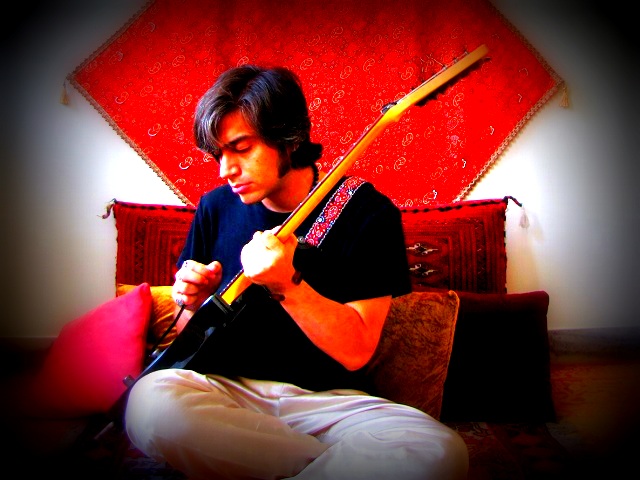
"Expect the unexpected" is a common phrase in English, a joke on some levels, sage advice on others. The music created by Iranian composer Salim Ghazi Saeedi is a case in point. What do you expect an electric guitarist from Iran to sound like? Do you expect that there are electric guitarists in Iran? He makes the music he hears in his head, and we call it progressive, RIO, chamber rock, and so on, but to him it is what's inside.
by Peter Thelen, Published 2014-01-25
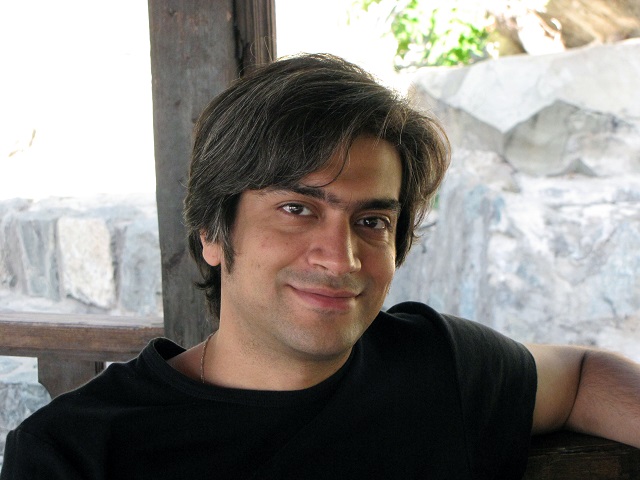 What is the situation in Iran for rock musicians, and how has that changed over the years?
What is the situation in Iran for rock musicians, and how has that changed over the years?
Before the Islamic revolution in 1979 rock music was growing fast and finding its own place and blend in Iranian music scene — as in some works of Kourosh Yaghmaee and Shahram Shabpareh. After the revolution, Iranian government has undergone dramatic changes in terms of approach toward rock music — an approach that I regard more chaotic. For the first years even carrying musical instruments was banned and many musicians migrated from Iran. It was not before Mohammad Khatami presidency in 1999 that rock concerts became widespread especially in Tehran. From Joe Satriani and Pink Floyd cover gigs, to Mississippi blues (that I remember the Iranian guitarist introduced the genre at first) to original Iranian doom metal songs sung in English and original Iranian rock albums of the band O-Hum. But this scene only lasted for two or three years. After that the Ministry of Intelligence and Judiciary System treated rock musicians as devil-worshipers, junkies, and people spreading the Western culture (Western culture is regarded a taboo in views of fundamentalists). After that time limited rock concerts have been held in Tehran (the cultural activities in other parts of Iran are more limited and state-controlled) including one or two formal and big pop/rock concerts a year, a few small concerts in universities or music classes and underground concerts in closed-doors cafes and personal residencies. These days you still find pamphlets in teenager, full of cigarette-smoke cafes about underground concerts covering Tool songs or even original songs in styles of Pink Floyd and Eloy (the latter is extremely popular in Iran); underground concerts that you have to make a phone call to ask for the address. I find an interesting point about music listeners in Iran that because of Iran's cultural scene being frozen in time and space due religious state control, the listeners' taste does not necessarily follow the world's music scene that is publicized by mass media. You will be surprised how many Iranian teenagers still follow 70s and 80s prog rock for example!
Does the government take a similar negative view of other Western music, like jazz, folk music, blues, classical?
In 2005 Ahmadinejad banned broadcasting of Western music from state TV and radio where no independent media is allowed to operate. Of course every now and then foreign bands (including jazz, classical, etc.) play in Tehran, and some local magazines cover them but it does not go beyond that. Mass media still do not show musical instruments (as being sinful in the religious government's view) or cover aspects of Western culture, including music. All I know about western music comes from listening to copied old-time cassettes, vinyl my family used to listen in pre-revolution era (among them I remember The Doors and Bee Gees) and now audio CDs and MP3s. But as I guess all musicians have strong introspective fanciful minds, I have reconstructed western musical scene by studying music encyclopedias and magazines... "Clapton is God" is written on street walls of my fantasy strolls in 70s London. I have dreamed nights of New York jazz clubs through Thelonious Monk's fingers and deep eyes of Stevie Ray Vaughn's face have pierced my heart like many wayfarers of the cult of music.
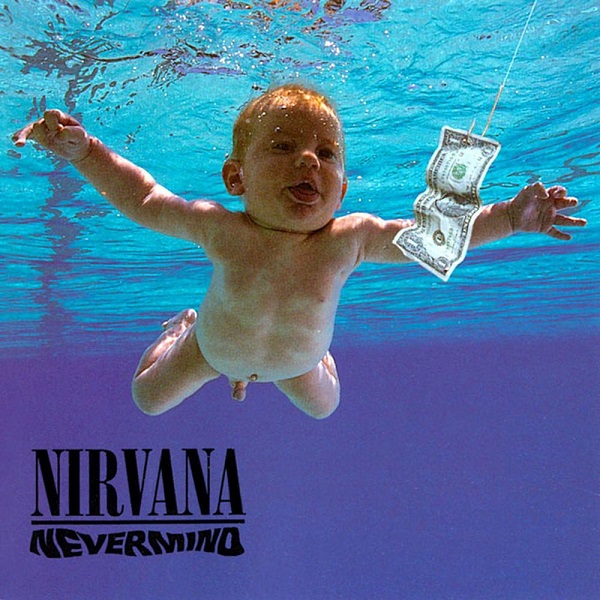 How did your own involvement with music begin? Were others members of your family musicians?
How did your own involvement with music begin? Were others members of your family musicians?
Until the age 18 I was merely a fanatic music listener. No one in my family or even relatives was a musician and because I was not in touch with the music scene I adored, I never even thought about becoming a musician. It all began when I listened to Nirvana's "Something in the Way" song on BBC Persian radio. At that time I used to record the radio programs on tape cassettes since access to new music was not easy (Western music publishers do not distribute in Iran). Listening to this song, something deep inside me changed and I felt that there will be something important in my way. To me it was a message of madness, anarchy and freedom and I found guitar, the window to such ideas. Then I involuntarily began my way in music composition and guitar playing up to this day. Of course I am not sure where this cause may lead me to, but I guess more revolutionary things may yet to be in the way...
Did you get some formal music training in composition, or are you self-taught?
I am completely self-taught in guitar playing, music composition and DAW music production. Based on personal research I also established and ran a commercial recording studio along with Arashk's drummer, Shahram Khosraviani for a year. I adopt the DIY approach in many aspects of my life. Even my day job is now Systems and Methods Analyst that in a nutshell means "studying how to do things!"
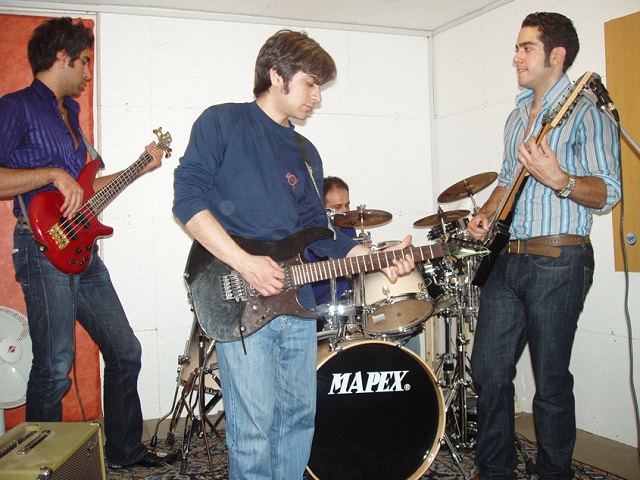 Was Arashk your first band or were there others prior to that? Arashk already existed before you joined, correct?
Was Arashk your first band or were there others prior to that? Arashk already existed before you joined, correct?
Arashk was my first band and I published three albums of my compositions there: Abrahadabra (2006), Sovereign (2007), Ustuqus-al-Uss (2008). [Before I Joined] Arashk band members, Pouyan Khajavi and Shahram Khosraviani, had already composed a few hard rock songs with Persian vocals and had performed them at universities in Tehran. We finally recorded those songs in our personal studio as the album YELL (2008). Amir Jahanshahlou was the band's bassist for a time and accompanied us at concerts but the bass recordings in all Arashk albums was done either by me or Pouyan.
You are an engineer by training, but a recording artist by choice. Math and science versus expression and creativity. How did (and do) you manage to balance those two seemingly opposing disciplines, and how do they inform and support each other in your life in both endeavors?
From age 10 I had been into computers... Commodore 64, IBM 8086 and so on. I even worked as a part-time C programmer during high school. This background made me fast and efficient on working with computers that helps me at engineering and creative jobs both. I am literally involved in all aspects of my music business myself. So being fast at setting up the DAW software so that the creative idea does not go away is important and so is maintaining the Access database recording the history of all the publicity work I do. Meanwhile in accordance to your opinion and in contrary to many engineers I believe that science and art are separate disciplines. I separate them because I see reason and intuition levels of consciousness different in nature. When you create as an artist, you are intuitively an omniscient God while reason has no place in determining what creative idea should come next or what suits best. But immediately after you want to record the idea on a real medium you will have to consider reasoning parts too. To sum it up, my science self helps to manifest and publish the inner creative artist into real world. I guess the secret to balancing intuitive and reasoning faculties is to always be ready to grasp and value what these faculties are suggesting. I always try to value the intuitive voice in my head regardless of how irrational it may seem and also value the doubt questioning my decisions. Each of these voices intends a meaning and needs an action (that may be a self-corrective one in cases) but I do not avoid them until I have deciphered them.
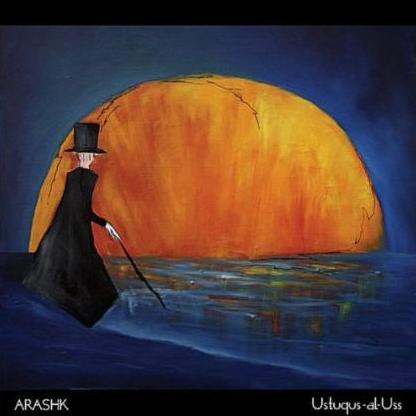 With Arashk, on the three albums that you composed for the band (Abrahadabra, 2006, Sovereign, 2007, and Ustuqus-al-Uss, 2008), if I’m reading the credits correctly, you composed all the material, and played all the instruments on those as well, with only a few exceptions. So effectively those were solo albums anyway, correct?
With Arashk, on the three albums that you composed for the band (Abrahadabra, 2006, Sovereign, 2007, and Ustuqus-al-Uss, 2008), if I’m reading the credits correctly, you composed all the material, and played all the instruments on those as well, with only a few exceptions. So effectively those were solo albums anyway, correct?
That's right. The story is at the time I joined the band (2004) they were working on songs that we finally recorded in our studio as YELL (2008) album. During these years I was continually composing and the band rehearsed some of them too. In that time band members had more daily life obligations than mine and so my music composition pace overtook theirs!
How did your bandmates feel about that arrangement during that time? Were you able to play their instruments better than they did?
Pouyan Khajavi is a great guitarist and I have always admired him for his guitar playing and hard rock composition skills, but the style I was composing and experimenting was different and as I said I had more time to put it in music. In order to listen to Pouyan's furious guitar playing you should listen to the second guitar solo of Ustuqus-al-Uss-al-Avvalin-val-Akharin that is available for full streaming on my website. Shahram Khosrviani is also a very inspiring musician but our limitation at the time was recording drums parts. Apart from financial limitation, the like-minded studio engineers were hard to find in a rock/metal-deprived music scene of Iran. At last the complete band collaboration happened in hard rock album YELL (2008) that features Pouyan’s voice singing in Persian.
 In 2008, you started your own studio with Shahram Khosraviani, but closed the studio only one year later (following Ustuqus-al-Uss and YELL). How many other artists recorded there during that time, and in the end, was the studio not profitable enough to keep open?
In 2008, you started your own studio with Shahram Khosraviani, but closed the studio only one year later (following Ustuqus-al-Uss and YELL). How many other artists recorded there during that time, and in the end, was the studio not profitable enough to keep open?
We recorded a few pop and traditional music artists. There were also many rap clients that I was escaping from! Maintaining a business in Iran, you have to put energy in many off-the-topic problems. To let you have a clearer picture, I mention Ease of Doing Business Index published by World Bank for which Iran is ranked 152nd vs. US being 4th among all countries. Plus there are Ministry of Islamic Culture and Guidance complications regarding permissions for registering the company and publication. So at the end many such businesses end up being underground in Iran and consequently limited... There is also Corruption Perceptions Index (from Transparency International): Iran 133rd vs. US 19th meaning corrupt bureaucracy and unjust business competency.
Since that time, for the three albums bearing your own name (Iconophobic from 2010, Human Encounter from 2011 and namoWoman in 2012), you have recorded these in a home studio. Does your home studio have comparable equipment, and do you find any further advantages in working from home?
My main instrument is electric guitar for which a good guitar amp and high-end audio interface (mine is RME Fireface 800) deliver very good results — however micing the guitar amplifier would be my next quality option that I do not have now. Now there exist new unbelievably high quality software guitar effects (like Native Instruments Guitar Rig) that cut the unlimited expenditures on effects. For other instruments like drums, bass, strings, etc. I use real samples produced by Spectrasonics and Native Instruments and others. Regarding my current style, I need no more, however I am so interested to re-record many of my tracks with real artists in future. No doubt a professional drummer or strings player knows the articulations of the instrument better than a guitarist!
![]() Let's talk about your last three releases. Iconophobic seemed to be informed more by chamber rock, while Human Encounter had a more evident jazz influence to it. Was this due to changing interests as your compositional interests evolved, or more of an effort to compartmentalize the wide variety of musical interests that you have had all along?
Let's talk about your last three releases. Iconophobic seemed to be informed more by chamber rock, while Human Encounter had a more evident jazz influence to it. Was this due to changing interests as your compositional interests evolved, or more of an effort to compartmentalize the wide variety of musical interests that you have had all along?
During the years of my music career, critics have taught me many things including the music genre I compose in! My music listening habit is absolutely diverse. If you examine my car music player right now you will find Vivaldi, Megadeth, Shajarian (Iranian traditional music), The Derek Trucks Band, and of course (drums rolling...) Thelonious Monk! Music is a self-expression outlet to me and since 2006 when I started composing, I have entered a special mind-set every year that I have sought to materialize in course of composition (This is the reason why I have published an album each year). I involuntarily choose the style based on the type of expression I have in my mind. So wild and self-centric emotions materialize as metal and my philosophical uncertainties as complex jazz lines.
You may also find it interesting that I have become aware of the whole Rock in Opposition genre through critics analyzing my works; the genre that I immediately felt an affinity with. 70s European bands felt the opposition stance due mainstream music industries while in Iran, religion limits music activities, dance and even showing instruments on TV. The exciting happening is that the only thing that made my music sound RIO was the similarity in mind-set while I was unaware of the genre or related bands. I have discussed this matter in length in an article: “Digging RIO: Rock in Opposition Resurgence in Iran?”
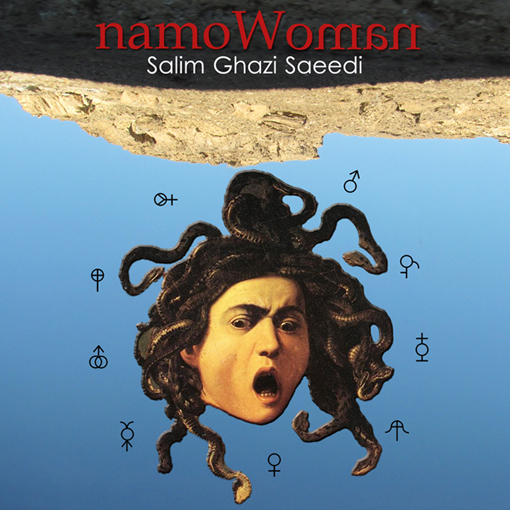 On your latest, namoWoman, the focus seems to be more in a rock influenced guitar direction, but still informed by the chamber and jazz elements of the two previous efforts. To my ears it recalled some of the instrumental work by Belgian band Present, or even that of mid-1970s King Crimson. But I'm sure there are other ideas and methods at work that I am unaware of. Could you elaborate on namoWoman?
On your latest, namoWoman, the focus seems to be more in a rock influenced guitar direction, but still informed by the chamber and jazz elements of the two previous efforts. To my ears it recalled some of the instrumental work by Belgian band Present, or even that of mid-1970s King Crimson. But I'm sure there are other ideas and methods at work that I am unaware of. Could you elaborate on namoWoman?
A unique and important musical feature in namoWoman is quarter tones; more accurately Persian music quarter tones. An additive that I guess has added a special dimension to the work. And because it is mingled with chromatic jazz phrases it is even indiscernible to Persian music masters' ears — as I have inquired the opinion of such experts. You may find the lesson I have published on my website regarding the subject: "Performing Persian Music Microtones on Electric Guitar." Another feature that I intentionally added to namoWoman realm is what I call "active silence." In some places at the zenith of the music’s passion, the complementary instruments stop and it is only a solo distorted guitar raging on an up-beat bass and drums. I am thrilled by this approach a lot and may use it again in my upcoming album.
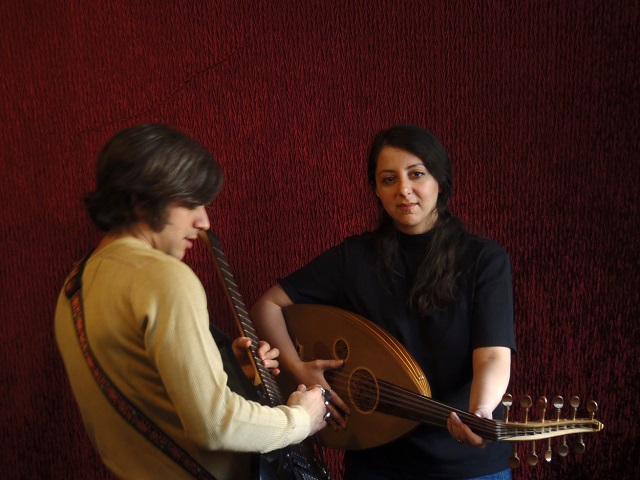 Can you shed some light on what you are working on as a follow-up to namoWoman? What is guiding your interests at the moment, and what direction will you be going next?
Can you shed some light on what you are working on as a follow-up to namoWoman? What is guiding your interests at the moment, and what direction will you be going next?
I am working on another album that adds another unique feature to all of my previous works and that is the super dynamic pickings used in traditional Persian music on tar and setar instruments (Iranian setar not Indian sitar!). In comparison to namoWoman you can expect more sparse parts and stronger "active silences" like I explained above and in the meantime more explosive outbursts of the instruments contrasting them. Conceptually speaking it is related to a blog post I posted recently entitled "Asking your permission to walk" addressing "presidents, leaders, prime ministers, kings and queens and governments of the world" that as a naked and innocent boy, I recently have "heard in the news that they own some parts of the world." Let me say it adopts a Parzival approach.
Will there be a time when you bring additional musicians into your projects, or are you comfortable continuing to do everything yourself?
I would love to have additional musicians on my projects! Working alone has been an obligation of being in Iran, far from my genre’s professional musicians. I do believe that co-composing and practicing in traditional rock band style greatly augments the outcome quality!
By the way in 2010 I had collaboration with Negar Bouban as an electric guitar vs. oud instrument experiment. You may watch the video here:
I read in your bio that Kurt Cobain was a big influence on you while you were getting into music and learning to play, yet I don’t hear much of his influence remaining in the six albums you have produced, other than the obvious fact that you are playing the same instrument.
That’s right. The extraordinary load of madness and anarchy in Kurt Cobain’s character and music made me to identify him as an expression of myself. Living in restricted and suffocated environment of Iran, I really needed such medium to set myself free.
Are there any other things you would like to share with our readers?
Being covered in Exposé magazine has been my wish since 2006 when I started composing music. I would like to thank you for your efforts on keeping the lighthouse of prog alive while unfortunately its glorious years have passed... I hope that such deep and elite entertaining genre sees its glory once again and apart from composing its genre I am personally ready to contribute in any other aspects of Prog Industry possible.
Filed under: Interviews
Related artist(s): Salim Ghazi Saeedi, Arashk
What's new
These are the most recent changes made to artists, releases, and articles.
- Review: LeoNero - Monitor
Published 2026-03-04 - Review: Sterbus - Black and Gold
Published 2026-03-03 - Release: Janel Leppin's Ensemble Volcanic Ash - Pluto in Aquarius
Updated 2026-03-02 15:06:51 - Release: Janel Leppin - Slowly Melting
Updated 2026-03-02 15:05:27 - Release: Alister Spence - Always Ever
Updated 2026-03-02 15:04:11 - Release: Let Spin - I Am Alien
Updated 2026-03-02 15:02:41 - Review: Falter Bramnk - Vinyland Odyssee
Published 2026-03-02 - Review: Exit - Dove Va la Tua Strada?
Published 2026-03-01 - Review: Steve Tibbetts - Close
Published 2026-02-28 - Release: We Stood Like Kings - Pinocchio
Updated 2026-02-27 19:24:02 - Release: Stephen Grew - Pianoply
Updated 2026-02-27 19:20:11 - Release: Thierry Zaboitzeff - Artefacts
Updated 2026-02-27 00:16:46 - Review: Kevin Kastning - Codex I & Codex II
Published 2026-02-27 - Release: Zan Zone - The Rock Is Still Rollin'
Updated 2026-02-26 23:26:09 - Release: The Leemoo Gang - A Family Business
Updated 2026-02-26 23:07:29 - Release: Ciolkowska - Bomba Nastoyashchego
Updated 2026-02-26 13:08:55 - Review: Immensity Crumb - Chamber Music for Sleeping Giants
Published 2026-02-26 - Release: The Gatekeepers - Diary of a Teenage Prophet
Updated 2026-02-25 15:55:58 - Review: Mars Lasar - Grand Canyon
Published 2026-02-25
